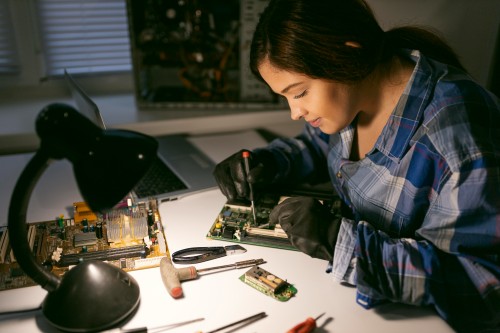Table of Contents
Introduction
The first distinction between M.E. and M.Tech is that Master of Engineering studies usually focuses on advanced engineering expertise and is a knowledge-based program. Master of Technology, however, is more skill-oriented and deals with practical knowledge of the subject at hand.
Let’s learn more about these differences, the eligibility criteria and more in this blog!
What’s the difference between M.E. and M.Tech?
There are few similarities between these two degrees but the fundamental difference between them is their practical application, course material, and focus.
| M.E. | M.Tech. |
| M.E. is more knowledge-oriented. | M.Tech is more skill-oriented. |
| This is a 2-year course | This is a 2-year course |
| M.E. is usually designed for students who plan for employment upon graduation. And for those who are already in the engineering workforce. | M.Tech is designed to produce Research Engineers who can get the position of“Technologist” in the industries and research institutes. |
| It emphasizes an in-depth concept clarification of facts. | It emphasizes a practical exposure to conceptual knowledge. |
| M.E. is mostly preferred by private universities or self-affiliated colleges. For instance IIT. | M.Tech is offered by colleges affiliated with various universities. |
| M.E. is a conventional term used for theory-based study. | M.Tech involves the use of technology and other aided stuff. |
Skill-set
A Master’s in Engineering and Master’s of Technology assists you with developing different skill sets. Choosing between these two based on your future career choices is essential.
| M.E. | M.Tech |
| Ability to communicate – verbal and written | Acquaintance with Industry Standards |
| Knowledge of the subjects studied in B.E./B.Tech | Teamwork |
| Creativity | Multifaceted exposure |
| Critical Thinking and Problem Solving | Leadership and Management Skills |
| Commitment and Desire to Learn | Acquaintance with Computers and IT |
| Attention to details | Giving and receiving feedback |
M.E./M.Tech Colleges in India
Most private colleges that offer M.E. or M. Tech programs have entrance exams, as well as additional requirements. Most government universities and IITs require aspirants to pass the GATE examination with a minimum score under the college or university’s requirements.
The specializations are available for M.E. and M. Tech in India are-
- Civil Engineering
- Aerospace Engineering
- Electrical Engineering
- Software Engineering
- Mechanical Engineering
- Automobile/Automotive Engineering
- Computer Science Engineering
- Aeronautical Engineering
- Agricultural Engineering
- Biotechnology Engineering
- Artificial Intelligence and Machine Learning
- Information Technology Engineering
- Chemical Engineering
- Electronics and Telecommunication Engineering
- Food Systems Engineering
- VLSI System Design Engineering
Read more: Artificial Intelligence versus Machine Learning
Eligibility criteria for M.E./M.Tech
To pursue M. Tech or M.E. in India, a candidate must have completed a B.E. or B. Tech degree in engineering from a government-approved university. Students who want to apply for an postgraduate engineering program must pass the GATE exam. This is one of the qualifying requirements for many schools and universities across India.

Various institutes have different admissions procedures and eligibility requirements. GATE, or Graduate Aptitude Test in Engineering, is the primary entrance exam for candidates interested in postgraduate engineering programs. This admission exam is held on a national level for 25 papers, including Biomedical Engineering, which was recently added.
Candidates who have completed a 5-year program in Science or Applied Sciences are also eligible to apply for a Master in Engineering or Master in Technology. The applicant’s acceptance is confirmed on the basis of their entrance examination scores.
Before applying for a Master’s program in engineering or technology, students need a minimum GATE score set by the university for any IIT college. Some colleges need students to have received at least 50% in their last qualifying exam for their undergraduate degree. For example, if you want to study at IIT Madras, you must have 75% marks in your bachelor’s degree.
GATE (Graduate Aptitude Test in Engineering): M.Tech Entrance Exam
GATE is a national-level engineering exam held every year for admission to postgraduate and doctorate programs at IITs, NITs, and IIITs. Seven IITs (Bombay, Delhi, Kanpur, Guwahati, Kharagpur, Madras, and Roorkee) and the Indian Institute of Science (IISc) in Bangalore jointly organize the Graduate Aptitude Test in Engineering.
Several government and commercial universities across the country accept the GATE score for admission to M. Tech programs. Engineers are also recruited through GATE by Public Sector Units (PSUs).
M.E. and M.Tech for working professionals
Diploma holders with specific work experience for a particular time are eligible for these programs. Admission to these programs is determined by different M.E. and M.Tech entrance tests. Some institutions also offer part-time M.E./M.Tech programs that last 5 semesters.
The Master’s degree is regulated by-
- All India Council for Technical Education (AICTE)
- UGC – University Grants Commission of India and
- National Board of Accreditation (NBA)
Engineering entrance examinations conducted at the national, state, and institute level admit students to M.E./M.Tech programs are offered by Indian technical institutes and universities.
We hope you found this blog informative and interesting. If you have any questions, drop them in the comments below. Or get in touch with us!
Key takeaways
- The main distinction between M.E. and M.Tech is that M.Tech deals with a more practical approach and M.E. is a knowledge-based program.
- Passing the GATE examination is necessary for admission to any college for a degree in M.E. or M.Tech.
- To pursue either of these programs the student must have a background in engineering.
- Engineers are also recruited after completion of the GATE exam.
FAQs
1. What is the procedure for students seeking admission to the M.E. or M.Tech programs?
Answer- The candidate must have a minimum of 50% in their Bachelor of Engineering degree and pass the GATE admission exam with a specific score as defined by the university.
2. What types of engineering postgraduate profiles are available?
Answer- Candidates who pass the exam can work as professors in prestigious engineering colleges or as Project Managers, Senior engineers, or Senior Research Associates in different companies and organizations. Companies may hire candidates who have finished their M.Tech as Researchers, Developers, or Technologists, based on their talents and practical expertise.
3. What kind of skills should an M.E. or M.Tech have?
Answer- Advanced understanding of the subject at hand, close attention to detail, inventiveness, quick problem-solving and learning skills, knowledge of computers and information technology, dealing and working with a team, and constructive criticism are all desirable qualities.
4. Which M.Tech specializations have the most students enrolled?
Answer- Candidates with a high GATE score are considered for M.Tech programs in Thermal Production or VLSI Design.
5. Can I still apply for M.E. if my B.E. grade was less than 50%?
Answer- Yes, you can apply to universities that provide Master’s degrees in engineering and don’t require a minimum of 50% in your bachelor’s degree, but do require an entrance exam like GATE for the rest of the admissions process. M.Tech admissions without GATE is not possible.
6. Is pursuing an M.E. or M.Tech degree after graduation a viable option?
Answer- Yes, pursuing a postgraduate degree is usually a smart idea because it expands your understanding of the subject you’re interested in while also providing you with more job options and a better salary.






